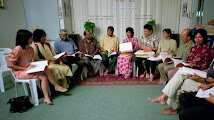In problem solving through consultation (or by oneself, through reflection/meditation over a problem), recommended to focus on the relevant spiritual value(s) to apply to the situation.
...while men and women are physically distinct, their spiritual identities are equal—the soul has no gender...
To the extent that government policies and programs recognize that institutional and social change must be accompanied by a transformation of human values, will they be able to effect abiding changes in the dynamics that characterize the allocation of responsibilities, including care-giving, between men and women...
The methods employed [in Bahá'í initiatives for preserving and strengthening the unity of the family and of society] emphasize encouragement, collective decision-making, the building of trust, and a complimentarity —rather than sameness—of roles.
One example of these principles in action is the Barli Development Institute for Rural Women in Indore, India... While the curriculum tackles issues such as alcohol abuse, violence, HIV/AIDS, and exploitation, these are understood as the symptoms rather than the problem itself. The primary aim, then, is to address underlying values and attitudes, which are primary obstacles to establishing more just relationships. The subjects addressed...include: sharing parental responsibilities; the equality of husband and wife; the education of girls; the use of non-adversarial decision-making; and service to the community. Couples who have completed the curriculum have noted a greater sense of unity in the family; a reduction or cessation of physical violence; a greater ability to express their thoughts at home and in public; and an increasing practice of consulting together to resolve family problems.
(“Striving Towards Justice: Transforming the Dynamics of Human Interaction” - Baha'i International Community, 2009. Read the full statement here.)
Leaders of governments and all in authority would be well served in their efforts to solve problems if they would first seek to identify the principles involved and then be guided by them.
(The Universal House of Justice, "The Promise of World Peace" - read the full statement here.)

Family harmony achieved by making values central to decision-making process
Share





No comments:
Post a Comment